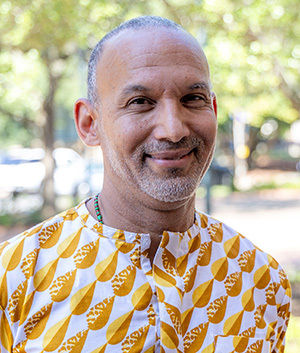Department of Anthropology
Directory
Terrance Weik
| Title: | Professor Graduate Director |
| Department: | Anthropology McCausland College of Arts and Sciences |
| Email: | weik@mailbox.sc.edu |
| Phone: | 803-777-6500 |
| Office: | Gambrell Hall, 408 |
| Resources: | Curriculum Vitae [pdf] |

Bio
Dr. Weik received his undergraduate degree from Wake Forest University and his graduate degrees from the University of Florida (1995, 2002). Weik chose a career in archaeology in order to explore African diasporan cultural origins, freedom seeking initiatives, struggles with inequalities, and social identities. Outside of academia, Weik’s career has involved brief interludes in GIS applications, Cultural Resource Management, and private consultation (museums, nonprofits, and government agencies).
Teaching
Dr. Weik’s pedagogical goals are to teach students how to be critical thinkers, resourceful knowledge seekers, globally-informed citizens, good writers, and life-long learners. Courses that Weik has taught include the following:
Course Title (#) Level
African American Cultures (ANTH 231) Undergraduate
Modernity, Archaeology, and the Recent Past (ANTH223)
Primates, People, & Prehistory (ANTH101)
Principles of Archaeology (ANTH319)
Violence & Peace: Anthropological Perspectives (ANTH216)
Archaeological Lab Methods (ANTH550) Mixed grad/undergraduate
Culture & Identity in the African Diaspora (ANTH580)
Seminar in Historical Archaeology (ANTH745) Graduate
Ethnohistory (ANTH773)
Research Interests
Archaeology, African Diaspora, Antislavery Resistance, Social Identity, Ethnogenesis, Self-liberation, Race, Native Americans
Research
Dr. Weik is a historical archaeologist who takes an anthropological, diaspora approach to Africans in the Americas. His research methods employ multiple lines of evidence such as documents, oral history, geophysics, GIS data, and material culture. Weik’s earliest research involved Africans who escaped from slavery in Florida as well as Mexico, Jamaica, and the Dominican Republic. Ethnogenesis and the linkages between indigenous people and Africans were particularly salient in his early works. His fieldwork in South Carolina explored plantation and urban slavery. As a consultant for the Audubon Society (Mississippi), Weik explored the transition from slavery to tenant farming, and helped restore a place for African American voices and heritage in the nature programs at Strawberry Plains plantation. While at Strawberry Plains, Dr. Weik discovered the potential for beginning a new phase of research on African and Native American interactions. His current project is examining indigenous Chickasaw slaveholding, community building, African agency, frontier entrepreneurship, and intercultural engagements. The latest dimension to this project involves the parallels between African diasporic displacement and “Indian Removal.” Weik is exploring this topic in an edited volume which he was invited to assemble (University of Florida Press), entitled The Archaeology of Removal in North America. This volume will explore how archaeologists working on various contexts—industrial complexes, colonial villages, rural towns, modern island fringes, reservations, impoverished homesteads, natural disaster sites, and prisoner camps—are uncovering the causes, consequences, and processes of forced human and material relocation.
Representative Publications
Books:
2012 The Archaeology of Antislavery Resistance. Gainesville: University Press of Florida.
Edited Volume
2019 The Archaeology of Removal in North America. Gainesville: University Press of Florida.
Articles:
2019 Engendering Labor, African Enslavement, and Human-Horse Relations in Chickasaw Territory. Journal Of African Diaspora Archaeology & Heritage 8 (1-2): 110-130.
2014 The Archaeology of Ethnogenesis. Invited Submission to the Annual Review of Anthropology. 43:291–305.
2012 Race and the Struggle for a Cosmopolitan Archaeology: Ongoing Controversies over the Representation and the Exhibition of Osceola. Historical Archaeology 46(1):1-30.
2009 A First Look at the Archaeology of African Americans at Strawberry Plains. Mississippi Archaeology. 41(1): 3-32.
2009 The Role of Ethnogenesis and Organization in the Development of African-Native American Settlements: An African Seminole Model. International Journal of Historical Archaeology 13: 206-238.
2008 Presencing African Americans at the Seibels House. South Carolina Antiquities 40: 108-129.
2004 Archaeology of the African Diaspora in Latin America. Historical Archaeology 38(1): 32-49.
1997 The Archaeology of Maroon Societies in the Americas: Resistance, Cultural Continuity and Transformation in the African Diaspora. Historical Archaeology 31(2): 81-92.
Book Chapters:
2007 Allies, Enemies and Kin in the African-Seminole Communities of Florida: Archaeology at Pilaklikaha, in Archaeology of Atlantic Africa and the Africa Diaspora, edited by Toyin Falola & Akin Ogundiran. Indiana University Press.
2005 Not Just Black and White, in Indigenous Peoples and Archaeology, edited by Claire Smith and Martin Wobst, pp. 281-297. Routledge. Coauthored book chapter with Ruth Mathis.
Recent Accomplishments
- Wenner Gren Foundation research grant
- U. of SC Provost Social Sciences research grant